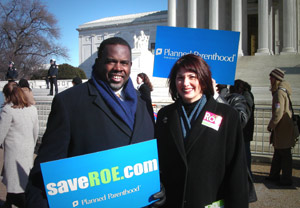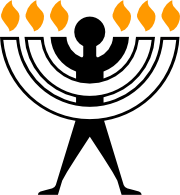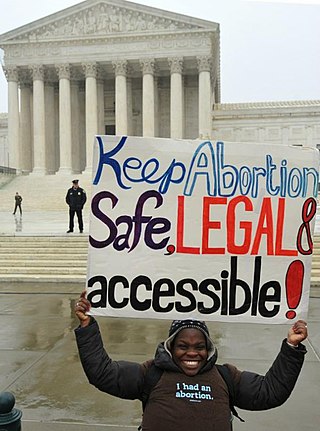The United Methodist Church (UMC) is a worldwide mainline Protestant denomination based in the United States, and a major part of Methodism. In the 19th century, its main predecessor, the Methodist Episcopal Church, was a leader in evangelicalism. The present denomination was founded in 1968 in Dallas, Texas, by union of the Methodist Church and the Evangelical United Brethren Church. The UMC traces its roots back to the revival movement of John and Charles Wesley in England, as well as the Great Awakening in the United States. As such, the church's theological orientation is decidedly Wesleyan. It embraces liturgical worship, holiness, and evangelical elements.

The United States abortion-rights movement is a sociopolitical movement in the United States supporting the view that a woman should have the legal right to an elective abortion, meaning the right to terminate her pregnancy, and is part of a broader global abortion-rights movement. The movement consists of a variety of organizations, with no single centralized decision-making body.

The mainline Protestant churches are a group of Protestant denominations in the United States and in some cases in Canada largely of the theologically liberal or theologically progressive persuasion that contrast in history and practice with the largely theologically conservative Evangelical, Fundamentalist, Charismatic, Confessional, Confessing Movement, historically Black church, and Global South Protestant denominations and congregations. Some make a distinction between "mainline" and "oldline", with the former referring only to denominational ties and the latter referring to church lineage, prestige and influence. However, this distinction has largely been lost to history and the terms are now nearly synonymous.
Reproductive Freedom for All, formerly NARAL Pro-Choice America and commonly known as simply NARAL, is a non-profit 501(c)(4) organization in the United States that engages in lobbying, political action, and advocacy efforts to oppose restrictions on abortion, to expand access to abortion and birth control, and to support paid parental leave and protection against pregnancy discrimination.

The Society for Humanistic Judaism (SHJ), founded by Rabbi Sherwin Wine in 1969, is an American 501(c)(3) organization and the central body of Humanistic Judaism, a philosophy that combines a non-theistic and humanistic outlook with the celebration of Jewish culture and identity while adhering to secular values and ideas.
The National Council of Women's Organizations (NCWO) is an American non-profit umbrella organization of more than 100 women's organizations. The organization has a membership of more than 11 million women. In 2005, Susan Scanlan became the chair of NCWO. Shireen Mitchell is the founding chair of the Media and Technology taskforce.
The Religious Coalition for Reproductive Choice (RCRC) is an abortion rights organization founded in 1973 by clergy and lay leaders from mainline denominations and faith traditions to create an interfaith organization following Roe v. Wade, the 1973 U.S. Supreme Court decision legalizing abortion in the U.S. In 1993, the original name – the Religious Coalition for Abortion Rights (RCAR) – was changed to the Religious Coalition for Reproductive Choice.

Catholics for Choice (CFC) is a non-profit organization based in Washington, D.C. that represents Catholic people who support reproductive freedom and advocates for abortion rights, Formed in 1973 as Catholics for a Free Choice, the group gained notice after its 1984 advertisement in The New York Times challenging Church teachings on abortion led to Church disciplinary pressure against some of the priests and nuns who signed it. It has lobbied nationally and internationally for abortion rights goals and led an unsuccessful effort to downgrade the Holy See's status in the United Nations. CFC was led for 25 years by Frances Kissling and is currently led by its President Jamie L. Manson.

The Reconciling Ministries Network (RMN) is an organization seeking the inclusion of people of all sexual orientations and gender identities in both the policy and practices of United Methodist Church. It is one of many Welcoming Congregation organizations to emerge in American Christianity in the 1980s. The ministry has over 1100 affiliated congregations and 42,000 affiliated individuals.

The General Conference, in several Methodist denominations, is the top legislative body for all matters within the denomination.
Methodist viewpoints concerning homosexuality are diverse because there is no one denomination which represents all Methodists. The World Methodist Council, which represents most Methodist denominations, has no official statements regarding sexuality. Various Methodist denominations themselves take different stances on the issue of homosexuality, with many denominations holding homosexual practice to be sinful, while other denominations ordain LGBT clergy and marry same-sex couples. The positions of the various Methodist denominations around the globe are outlined in this article.

Reproductive justice is a critical feminist framework that was invented as a response to United States reproductive politics. The three core values of reproductive justice are the right to have a child, the right to not have a child, and the right to parent a child or children in safe and healthy environments. The framework moves women's reproductive rights past a legal and political debate to incorporate the economic, social, and health factors that impact women's reproductive choices and decision-making ability.

Christianity and abortion have a long and complex history. There is no direct reference to abortion in the Bible, nor any explicit condemnation of abortion. The lack of discussion of abortion in Christian scripture has led to varied and divergent stances on the moral acceptability of abortion across Christian denominations and among Christians. Today, Christian denominations hold widely variant stances.

Minerva Garza Carcaño is the first Hispanic woman to be elected to the episcopacy of The United Methodist Church (UMC), the second-largest Protestant denomination in the United States. She was elected in 2004. Her first assignment was as Bishop of the Phoenix Episcopal Area of Desert Southwest Conference of the UMC. She was then appointed as Bishop of the California-Pacific Annual Conference of the UMC in 2012, and currently serves as Bishop of the California-Nevada Annual Conference of the UMC. She also serves as the leader of the United Methodist Church's Immigration Task Force.

Founded in 1987, Lifewatch, Taskforce of United Methodists on Abortion and Sexuality (TUMAS) is a 501(c)(3) organization that serves as the unofficial anti-abortion group within the United Methodist Church (UMC). The organization publishes a quarterly newsletter titled Lifewatch and is a member of the National Pro-Life Religious Council. The organization also frequently holds seminars to address within Methodist Christianity the theological, moral, and social aspects of defending women and their unborn children from abortion. It is committed to reversing the Roe v. Wade decision "by first providing theological leadership within the church, which will set an example that political, legal and cultural forces will follow."
United Women in Faith is the only official organization for women within The United Methodist Church (UMC). In 2022, United Methodist Women began doing business as United Women in Faith (UWFaith). Founded in 1869, the organization now has nearly half a million members. UWFaith offers all Methodist women opportunities for spiritual growth, leadership development, transformative education and service and advocacy. Its current advocacy priorities are climate justice and racial justice, including ending criminalization of communities of color and mass incarceration.
The Global Methodist Church is a Methodist denomination within Protestant Christianity subscribing to views that were propounded by the conservative Confessing Movement. The denomination is headquartered in the United States and has a presence internationally. The Global Methodist Church was created as a result of a schism with the United Methodist Church, after members departed to create a denomination seeking to uphold "theological and ethical Christian orthodoxy." Congregations that left the UMC to form the Global Methodist Church opposed recognition of same-sex marriage and the ordination of non-celibate gay clergy. Its doctrines, which are aligned with Wesleyan-Arminian theology, are contained in the Transitional Book of Doctrines and Discipline, its Book of Discipline, and in The Catechism of the Global Methodist Church. The church allows both women and men to serve as clergy. As of 2024, the church is composed of nearly 4,500 congregations and a similar number of pastors.











